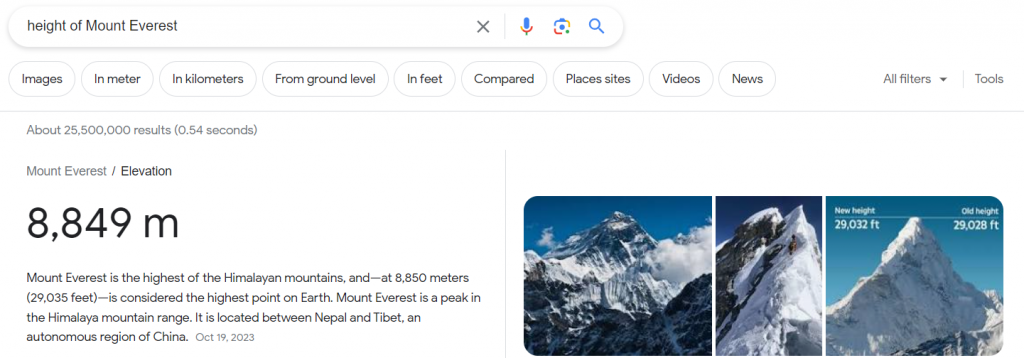

Search Landscape 2024: The Evolution of Search & Top Trends
Written By Otilia Crizbasan | 4 March, 2024
Future-proof your search strategy
Navigating the ever-changing world of online search can feel like trying to find your way through a maze. With so much happening in 2024 and new tools popping up left and right, it’s easy to feel overwhelmed.
That’s why we’ve brought together insights from our experts to demystify these changes and highlight the most significant search trends. Keeping pace with the latest updates in this space is key for any brand aiming to stay relevant and engage with their audience where they are naturally searching.
So keep reading to find out our top 4 predictions for the trends influencing the search landscape in 2024.
Top 4 search trends for 2024
- Artificial Intelligence for personalised search experiences
As we dive into 2024, AI and machine learning are reshaping search engines in exciting ways. These cutting-edge technologies are making search engines smarter, helping them grasp the true meaning behind what we’re looking for.
Thanks to AI, search engines now go beyond just finding relevant answers. They understand the intention behind our queries, aiming to match our specific needs and the context of our questions. It’s not just about getting results anymore; it’s about creating a search journey that feels personalised and intuitive.
As a result, this year we expect search to become even more personalised. Not just based on a given user’s search and browser history, but also for the perceived intention of the user at that moment.

Source: DALL-E 3
- The Rise of voice search and Natural Language Processing (NLP)
Voice search and NLP technologies are changing how users interact with online platforms. We expect this trend to continue as this technology becomes increasingly embedded in everyday life and users become more familiar and comfortable with its use.
A recent statistic reveals that more than 1 billion voice searches take place every month. This surge in usage signifies a trend shift towards preferring voice for certain types of search activities. It comes as no shock that younger people are spearheading the use of voice search. And this might have a subsequent impact, encouraging older generations to embrace it.
AI and generative search will help improve the results of voice searches by providing greater context in answers to questions and requests.
We spoke to Ema Kusaite, SEO Consultant at Found, a London-based digital marketing and SEO agency: “In the era where consumers believe that voice search is easier than searching online, a strong Voice Search Optimisation strategy isn’t just an advantage; it’s essential. Focus on ensuring optimal mobile experiences, integrating natural language patterns into keyword strategy, optimising content with long-tail terms and you will position your brand ahead of the game.”
- From Google to multi-platform discovery
It’s no secret that the landscape of search has extended far beyond Google. Many people are now using alternative platforms for insights and inspiration.
Over 60% of US online shoppers begin their journey on Amazon, while social media (especially TikTok) has emerged as a key discovery platform for younger generations, highlighting the diversified avenues of online search.
This evolution signals a broadening horizon for search marketing. It requires a recalibration from marketers and search tool suites, who must now harness data from these varied sources to remain competitive. At the same time, brands have to update what they consider important measures of success to match this new search landscape. As it gets harder to get website traffic from searches, we expect new benchmarks for success to emerge and brands to find new ways to reach their audience.
To stay competitive, brands will need to discern the optimal combination of search marketing platforms that resonate with their unique business objectives.
Tom Brand, Director of Growth at Found adds: “In recent years, brands relying too heavily on Google alone to scale their digital performance are seeing less efficiency from their existing budget.
Audience behaviours are changing, and across a broad range of demographics, social media is skyrocketing in importance across the conversion funnel. Understanding where your users are searching, what motivates them to convert, and building full-funnel digital solutions that capture these motivations is the key to avoiding this efficiency ceiling and scaling digital performance.”
- Winning visibility with Zero-Click search optimisation
Many search result pages include snippets that provide a quick summary of what you’re looking for. These boxes, known as ‘Position Zero’, can show up as a paragraph, a list, a video, or in other formats. And they’re usually the first thing you notice on the search page. For instance, this is what you’ll get if you’re searching for ‘height of Mount Everest’:

More than half of Google searches end without a click. So these featured snippets take up a big part of the search engine results page and yet result in no click-through. In 2024, we expect the integration of AI-powered search features like SGE’s AI Snapshot, which provides quick answers to users, to add complexity to the challenge of securing this coveted spot and likely increase the number of zero-click searches.
Google gives Position Zero to the content it finds most relevant and informative in a concise way. This means that to get your content featured in a snippet, it needs to be clear, to the point, and directly answer people’s search questions.
Final thoughts
Heading into the rest of the year, it’s important for brands to keep up with the latest trends in search to remain competitive. This means keeping an eye on the evolving digital landscape, including voice search, emerging channels and the new AI and machine learning algorithms that influence the space.
Harry Calvin Williams, Head of Growth at Found shares his thoughts: “More than ever, our clients are looking to us to help them understand how to navigate the changing search landscape. We are probably seeing technology advance at a faster rate than user behaviour is changing, and so it’s important to assess both the predicted, and then observed, changes to search behaviour on a regular basis.”
Williams explains that with his clients, they use data from platforms like Google Search Console and Luminr to constantly evaluate the differing search results and click-through rate behaviour across different search categories, industries and regions.
“As ever, it is always the businesses who are willing to adapt quickly who seem to come out on top in the competition for those increasingly valuable clicks,” expresses Williams.
With a proper strategy and the best tools at their disposal, brands can improve their online visibility and achieve their objectives.
Get in touch with our team to discover how Luminr can help you dominate search.





